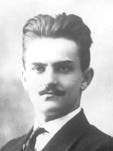|
BIOGRAPHY |
 |
||||||||||||
|---|---|---|---|---|---|---|---|---|---|---|---|---|---|
|
|
|
|
|
|
|
|
|
|
|
|
|
|
|
|
Georges
Antoine |
Georges ANTOINE (Liège 1892 - Bruges 1918) |
||||||||||||||||||||||||||||||||||||||||||||||||||||||||||||||||||||||||||||||||||||||||||||||||||||||||||||||
|
His
op. 1, composed in 1910, was "Les
Sirènes" for double mixed choir. This was
followed in 1912 by "Deux Mélodies" op. 2,
the Violin Sonata in A minor op. 3 and "Deux
Chansons dans le style ancien" op. 4a. But the
First World War broke out in 1914 and Georges
Antoine joined up ; he had just composed a
Piano Concerto in G Minor (lost at this time).
During the battles on the Yser, he miraculously
survived a hail of bullets, but he was soon struck
down by illness after spending the wet spring
months in the trenches. From then on his progress
was from one hospital to another. Weakened,
discharged from the army and without ressources, he
went to France and settled in Saint-Malo, where he
gave lessons, organised concerts in aid of the poor
and began to compose again. This fertile period,
1915-1916, during which the Sonata op. 3 found
its definitive form, also saw the genesis if the
Piano Quartet in D minor op. 6, the song "Vendange
de 1914" op. 8 and several other melodies, mainly
settings of Beaudelaire, Corbière, Klingsor,
Samain and Verlaine, which make up op. 4b and op.
7. As the war went on his state of health became
more and more precarious, although he had welcome
periods of remission. 1917 and 1918 saw the
composition of "Veillées d'armes"
op. 9, a poem for orchestra, and the songs
"Wallonie" op. 10, "Noël" and "Voici,
riche d'avoir pleuré". In the summer of
1918, the Allies began an offensive which soon led
to victory. Despite his fragile health Antoine was
keen to return to the front, and he experienced the
joy of entering a reclaimed Bruges at the beginning
of October. But he was struck down by fever. His
friends and relations lost sight of him in the
frenzy of liberation. News reached them in a
dispatch : "On the morning of 13 November the
doctor admitted that he could do no more, and
Georges was told that his condition was beyond
hope. But he had suffered so much during the war
that he was unwilling to believe how desperately
ill he was. That evening, around seven o'clock, he
died very peacefully, without pain, fully
conscious, and still talking about his planned
return to Liège, his mother and the "Prix de
Rome…" Antoine's
work had already given rise to some very favourable
opinions. Vincent d'Indy declared that he had been
"marvellously gifted" and found his quartet
"remarquable". François Rasse expressed the
view that "the death of this young composer,
perhaps a genius, was an irreparable loss for
Belgian musical life"; Charles Van den Borren
ranked him with Lekeu and Chausson and estimated
that the future would have accorded him "a place
amongst the great in the development of music".
Philippe
Gilson |
|||||||||||||||||||||||||||||||||||||||||||||||||||||||||||||||||||||||||||||||||||||||||||||||||||||||||||||||
|
|
|||||||||||||||||||||||||||||||||||||||||||||||||||||||||||||||||||||||||||||||||||||||||||||||||||||||||||||||
|
|
|||||||||||||||||||||||||||||||||||||||||||||||||||||||||||||||||||||||||||||||||||||||||||||||||||||||||||||||
|
|
|||||||||||||||||||||||||||||||||||||||||||||||||||||||||||||||||||||||||||||||||||||||||||||||||||||||||||||||
